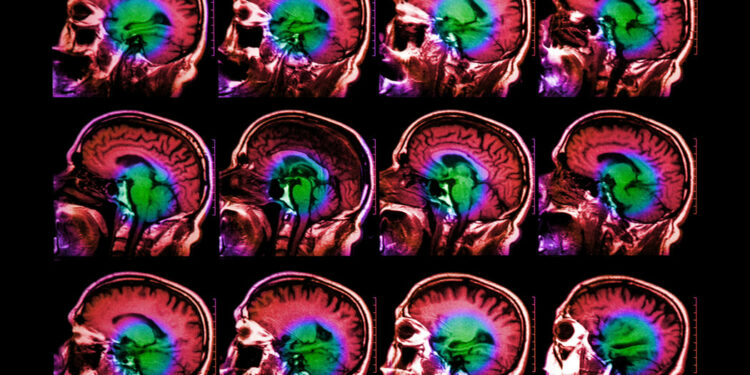Table of Contents
Symptoms
- New onset or change in pattern of headaches
- Headaches that gradually become more frequent and more severe
- Unexplained nausea or vomiting
- Vision problems, such as blurred vision, double vision or loss of peripheral vision
- Gradual loss of sensation or movement in an arm or a leg
- Difficulty with balance
Accordingly, Can a brain tumor be missed on an MRI? While MRI is not the only piece in the puzzle for MS diagnosis, it plays a significant role A false negative diagnosis made off an MRI scan could lead the neurologist and patient down an incorrect path and delay an accurate diagnosis, or potentially miss it entirely
What can be mistaken for a brain tumor? Brain tumour misdiagnosis can commonly be diagnosed as the following diseases, given the similarity across symptoms a patient suffers with: Alzheimer’s disease Encephalitis Headaches or migraines
What does a brain tumor feel like in your head? They are often described as dull, “pressure-type” headaches, though some patients also experience sharp or “stabbing” pain They can be localized to a specific area or generalized They can be made worse with coughing, sneezing or straining
Further, Do brain tumor symptoms come and go? These tumors might cause different signs and symptoms, depending on where they are and how fast they are growing Signs and symptoms of brain or spinal cord tumors may develop gradually and become worse over time, or they can happen suddenly, such as with a seizure
How do you rule out a brain tumor?
A sample of the tumor’s tissue is usually needed to make a final diagnosis A biopsy is the removal of a small amount of tissue for examination under a microscope and is the only definitive way a brain tumor can be diagnosed
Can doctors miss brain tumors?
Can Tumors Be Misdiagnosed? Many times, due to an individual experiencing the above symptoms, a tumor in the brain can be misdiagnosed In most cases, when an individual is experiencing these symptoms, the physician will order tests such as CT scan, MRI, and EEG
Will a brain tumor show up in blood work?
Blood tests are not used to diagnose brain or spinal cord tumours However, they are routinely done to provide a baseline before any planned treatment They can provide helpful information about your general health, how other organs are functioning, other medical conditions and the possible risks of treatment
How common are brain tumors by age?
Primary Brain Tumors Approximately 4,200 cases are expected to be diagnosed in people under age 20 93% of primary brain and CNS tumors are diagnosed in people over 20 years old; people over 85 have the highest incidence The average age at diagnosis is 57
Who is most likely to get a brain tumor?
Brain tumors are more common in children and older adults, although people of any age can develop a brain tumor Gender In general, men are more likely than women to develop a brain tumor However, some specific types of brain tumors, such as meningioma, are more common in women
What are the odds I have a brain tumor?
Overall, the chance that a person will develop a malignant tumor of the brain or spinal cord in their lifetime is less than 1%
What is the main cause of brain tumor?
In some cases, a person may be born with changes in one or more of these genes Environmental factors, such as exposure to large amounts of radiation from X-rays or previous cancer treatment, may then lead to further damage In other cases, the environmental injury to the genes may be the only cause
What are the first signs of a brain tumour?
Common symptoms include:
- headaches
- seizures (fits)
- persistently feeling sick (nausea), being sick (vomiting) and drowsiness
- mental or behavioural changes, such as memory problems or changes in personality
- progressive weakness or paralysis on one side of the body
- vision or speech problems
Would a brain tumour show in blood test?
Blood tests are not used to diagnose brain or spinal cord tumours However, they are routinely done to provide a baseline before any planned treatment They can provide helpful information about your general health, how other organs are functioning, other medical conditions and the possible risks of treatment
How do you feel when you have brain tumor?
A brain tumor also prevents fluid from flowing freely in the brain, and the increased pressure commonly causes headaches This may result in new headaches or a change in your old pattern of headaches, such as the following: You have severe unexplained vomiting You have persistent pain, but it’s not like a migraine
What are the early signs of a brain tumour?
Common symptoms include:
- headaches
- seizures (fits)
- persistently feeling sick (nausea), being sick (vomiting) and drowsiness
- mental or behavioural changes, such as memory problems or changes in personality
- progressive weakness or paralysis on one side of the body
- vision or speech problems
Can blood tests detect brain tumours?
Some brain tumours such as pituitary gland, pineal region and germ cell tumours can change the levels of certain hormones and chemicals in your body You may have blood tests to check for specific hormones and markers to help diagnose a brain tumour







